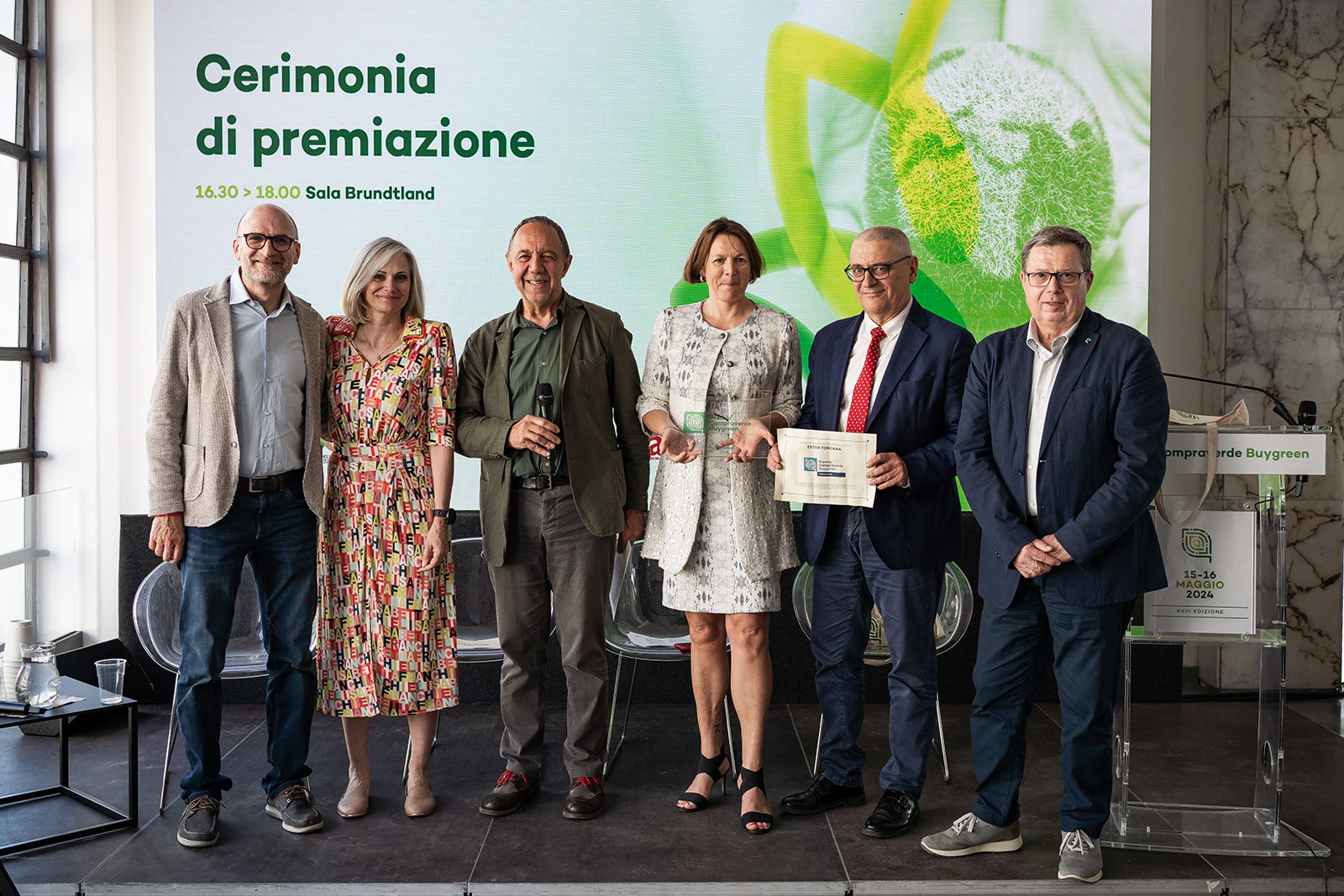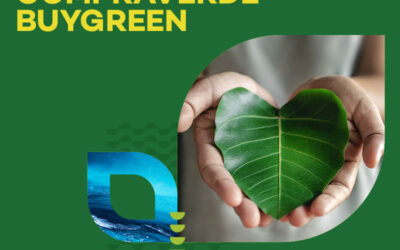The 18th edition of the Compraverde Buygreen Forum, promoted by Fondazione Ecosistemi, closed with the presentation of the Compraverde Buygreen Award: today the only award in Italy dedicated to the best Italian GPP experiences. The Compraverde Award was created in 2008 with the aim of highlighting the importance of the commitment to comply with the application of the minimum environmental criteria for true sustainability, on green canteens and related food education, on the zero-kilometre supply chain, on proper management of the waste cycle, on green choices and energy efficiency, from sustainable mobility to tourism based on the circular economy to carbon dioxide reduction.
This year’s edition saw the best experiences awarded in the following sections: GPP policy, green tender, green canteen, green hospital, green sport, social procurement, green culture. Below are all the award winners with the motivations section by section.
For the GPP policy section, the prize went to the University of Turin for having continuously pursued the commitments underwritten in the Protocol of Agreement, Ecological Public Procurement, placing GPP at the centre of the University’s activities aimed at reducing environmental impact and spreading culture and good sustainability practices. Mention, on the other hand, for Aria, the regional company for innovation and purchasing, for the inclusion of green purchasing in the activities of the central purchasing body with in-depth paths for the benefit of public administration demand, market supply and the needs of citizens and businesses. Another mention for the Municipality of Padua, for its careful commitment in the systematic adoption of green procurement characterised by concreteness and well-defined objectives in the Action Plan updated and monitored over time.
For the Green Procurement section, awards went to the University of Cagliari for having chosen to convey, through events, the image of a University that is increasingly sustainable and attentive to environmental protection issues, by including in the tender documents all the clauses applicable to the Cams relating to the service of organizing and holding events; the Region of Lazio, for its innovative capacity, for its getting involved in challenges that go beyond the existing criteria, analyzing the impacts of the service to understand how to reduce them. A virtuous example of how to achieve environmental sustainability objectives; the Municipality of Padua for the clarity with which the Municipality drew up the tender documentation in accordance with the Green Cams, defining in detail and clarity the contractual clauses on sustainable site management and thus guaranteeing the execution of the work in accordance with environmental sustainability objectives. Mention, on the other hand, to the University of Siena, for having succeeded in expressing with an interesting synthesis the complexity that derives from the application of two different systems: that of the Cams for construction – which must guarantee a minimum environmental performance – and that of the Leed certification which, with its scoring system, amplifies the minimum criteria to guarantee more ambitious and monitorable environmental performance in all the phases of realization of the work.
For the Green Canteen section, the prizes went to the Municipality of Nuoro, for having based the canteen service on the pursuit of Green Public Procurement objectives, basing the contract on a series of principles such as education and food quality; reduced environmental impact, reduction of waste; valorisation of local and traditional products, and, more generally, for the holistic vision it manifested in taking into account the many aspects that characterise school catering: educational, environmental, social, productive, territorial; to the Turin Municipality for adopting the fixed cost economic offer criterion, stimulating upward bids in improving the quality of the food and service, and for its commitment in implementing the ‘Project for controls of respect for human rights and decent working conditions along supply chains’ ; to Dsu Toscana for having based the sustainability of the service on a series of indispensable criteria and values, making it excellent from a social, nutritional, environmental and economic point of view, where the price element has taken the form of a fixed cost, corresponding to the cost of the meal of the catering service, on the basis of which economic operators compete only on the qualitative profiles of the offers. Mention, on the other hand, was made for Intercent-ER for the organisation of a catering service aimed at three different types of entities and, therefore, different types of users, which, through collaboration between them, made it possible to realize strong benefits from an environmental point of view as well, to the benefit of a reduction in CO2 emissions and efficiency gains in terms of energy consumption and waste management.
The Green Hospital Award went to Estar Toscana for having integrated criteria in its tender documents to guarantee the reduction of the environmental impact of its activities on the environment and citizens’ health. A virtuous example to be replicated in a sector such as the supply of medical gloves for which minimum environmental and social criteria do not yet exist.
For the Green Sport Award, the mention went to the Municipality of Jesolo for the EnergiaPura Series 2024 event for its commitment to building an event with a low environmental impact to be consolidated over time; mention to the Municipality of Naples for the Spaccanapoli 40th edition event for the ecological and social commitment to sustainability pursued through the realisation of an event characterised by compliance with certain environmental criteria that promote environmental awareness and positive social action also through the involvement and enhancement of the Naples area.
For the Social Procurement section, the award goes to Estar Toscana for having integrated in the tender documents criteria to guarantee decent working conditions, both as an evaluation element and as an execution requirement, along the entire supply chain, and for having foreseen forms of dialogue between the contracting station and the contractor, as well as forms of verification, adequate to guarantee the effective implementation of social criteria. Mention, instead, to the Lazio Region for having introduced criteria for the promotion of equal opportunities in the security sector.
For the Green Culture section, the mention went to the Royal Palace of Caserta for having embarked on the path of eco-sustainability using an actual regulation for concessions for the temporary use of spaces in the Royal Palace of Caserta for cultural events that pay attention to the environmental impacts associated with their realisation through compliance with certain environmental criteria.




